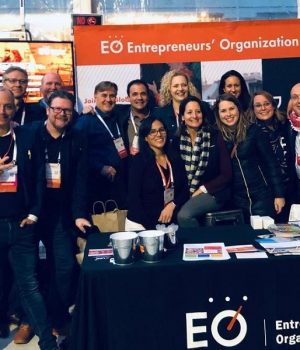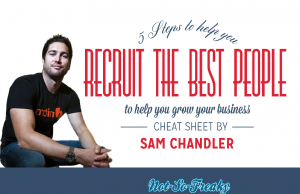Pre-pandemic, many businesses were moving towards adirect-to-consumer (D2C) model, opting for greater control over customer relations in our rapidly changing retail landscape.
The pandemic not only amplified this shift, but left many brandswith no option other than to quickly pivot to DTC to survive.
Switching to D2C can not only help boost online sales, but allows a brand to take greater control of their communications strategies, supporting customers with greater empathy, managing their expectations better and learning what their customers want!
As the communications chair of Entrepreneurs’ Organisation (EO) Melbourne, I sat down with my peers to hear how they are successfully cutting out the middlemen with D2C.
Stetch & Etch founder Ash Bent, a neon sign business operating in the wedding and events industry, saw their core market collapse entirely for a prolonged period so were strategic in refocusing on eCommerce, selling custom Neon signs into the US market.
He said “Pre-COVID 40% of our revenue was B2B, 55% was D2C with a Customer Service team assisting Customers in their purchase and 5% was eComm DTC. Now, 80% of our revenue is eComm D2C, 10% is assisted Sales and 10% is B2B.”
Their strategy moving forward, he says, is to increase their online sales presence globallyhitting new markets.
Rahul Kale, EO Melbourne member and founder of Sunpower Renewables, manufacturers of portable lithium solar generators, also shared how COVID impacted his business.
He says, “Prior to the pandemic we had almost zero D2C sales, but this now accounts for almost 35% of our business. This channel continues to grow aggressively, and we are hopeful to reach 50% by 2022.”
“Traditionally solar energy companies always operated through multiple middle-men including solar panel distributors and EPCs for installation.”
“We successfully used this channel before but with the advent of the pandemic in 2020 we re-aligned our business model, taking a more D2C approach to our sales.”
“Our R&D team developed an innovative handheld plug-n-play lithium solar generator that requires zero installation and maintenance. This has allowed us to list our products on multiple e-commerce sites and sell products directly to consumers.”
“We’re finding that consumers are appreciating the innovative product and reduced costs due to the lack of middlemen which has helped us to dramatically increase in D2C sales.”
Lastly I spoke with William Du, co-founder of gift company Short Story who says they’ve been moving towards a D2C model as it allows greater control over their branding.
Here are 7 key benefits of D2C:
Increased Margins
By cutting out the middlemen, you can significantly reduce outlays and increase profit margins, which in a volume business can be significant. Rahul Kale shared that D2C is cheap for both the customer and producer keeping the focus on product quality.
Ownership of customer data
Understanding your customers is key and being able to retain your customer data provides greater insights and analytics. Ownership of customer data enables you to exert greater control over how and when you reach them.
Improved customer experience and direct feedback
Ash Bent, founder of Sketch & Etch says feedback is a huge benefit. “You have direct contact with the end Customer, so you get a crystal-clear understanding of their pain points and how you can help them.”
“The feedback loop happens extremely rapidly and allows for you to quickly adjust your offering and message to better suit your target market.”
Sunpower Renewables founder Rahul Kale agreed, sharing “D2C improves communication and engagement with the consumer, meaning nothing is lost in translation for the customer or the manufacturer.”
“The feedback you get is direct and helps with product development and R&D. For example, this helped us create a plug and play product that a customer can buy online and use as easily as a toaster.”
Full range of products available
While retailers may only stock a limited range, owning your sales channels means sharing your full range of products.
Speed
D2C means greater control over delivery speeds and in getting your product to market.
Control over brand story and reputation
William Du says “ror Short Story it is really about being able to correctly express Short Story as the brand we want it to be, especially now that we have partnered with Disney we need to make sure our branding and message is on point.”
“Engaging directly with our customers lets us know first hand what we are doing right but more importantly what we are doing wrong.The increase in margin is really just a bonus.”
Ability to scale
Sunpower renewables “The benefit of scale – through e-commerce you can reach millions of customers, across different geographies and customer segments.”
“You are not restricted by the depth and reach of the middlemen neither do you need to appoint multiple partners/distributors for your products.”








![Need more leads? Here are five strategies [FREE DOWNLOAD]](https://anthillonline.com/wp-content/uploads/2016/04/james-FIVE-SIMPLE-STRATEGIES-TO-GET-MORE-LEADS-01-06.pdf-Box-2016-05-13-15-49-32-100x75.png)
![Do you have happy staff? 5 ways to improve performance [FREE DOWNLOAD]](https://anthillonline.com/wp-content/uploads/2016/06/chris-smith-cheatsheet-04c.pdf-Box-2016-06-30-20-45-20-100x75.png)
![Generating Web Traffic with Mark Middo and James Tuckerman [FREE REPORT]](https://anthillonline.com/wp-content/uploads/2015/08/Capture3-100x75.jpg)
![Three easy wins when using LinkedIn with David Hobson [FREE REPORT]](https://anthillonline.com/wp-content/uploads/2015/08/3quick-wins-100x75.png)
![The Top 5 Most Insanely Dumb Mistakes made by Rookie and Seasoned LinkedIn Users, with David Hobson [FREE REPORT]](https://anthillonline.com/wp-content/uploads/2015/07/Screen-Shot-2015-11-26-at-14.29.18-100x75.png)
![A reminder to every entrepreneur: sometimes what looks impossible, actually isn’t [VIDEO]](https://anthillonline.com/wp-content/uploads/2014/04/PluckyHamster-300x350.jpg)

![How to make your competitors do your advertising for you; a nifty trick [VIDEO]](https://anthillonline.com/wp-content/uploads/2014/03/DHLStunt-300x350.jpg)
![How to market your business when you don’t have a business yet [CHEAT SHEET]](https://anthillonline.com/wp-content/uploads/2016/01/oli-gardner-memes-02-300x194.jpg)
![Need cash for your startup or innovation? Here’s the Ultimate Grant Guide for Innovators and Startups [FREE DOWNLOAD]](https://anthillonline.com/wp-content/uploads/2015/10/INNOVATORS-GRANT-GUIDE-NFSU-page-spread-100x75.png)
![Four Page Digital Marketing Strategy [FREE RESOURCE]](https://anthillonline.com/wp-content/uploads/2015/01/FOUR-PAGE-IMAGE-100x75.png)
![How to give good headlines, and create emails that get opened [CHEAT SHEET]](https://anthillonline.com/wp-content/uploads/2013/11/7-steps-cheatsheet-3d-cover-nuova--100x75.png)
![How Master the Art of Sales Even if it Makes You Feel All Weird and Icky Inside with Phil Anderson [CHEAT SHEET]](https://anthillonline.com/wp-content/uploads/2015/08/PHIL-ANDERSON-COVER-100x75.png)
![New Zealand’s Xero eyes US IPO, further disruption as subscribers increase [INFOGRAPHIC]](https://anthillonline.com/wp-content/uploads/2014/07/sruuuuujana-212x194.png)
![Ever wonder if your ‘content marketing’ is really just crap? You gotta see this! [INFOGRAPHIC]](https://anthillonline.com/wp-content/uploads/2014/08/content-100x75.jpg)
![7 Business Lessons From Game of Thrones [INFOGRAPHIC]](https://anthillonline.com/wp-content/uploads/2014/10/infographic-games-of-thrones-041-100x75.jpg)
![How to build your own Media Empire… In seven steps with Nathan Chan [INFOGRAPHIC]](https://anthillonline.com/wp-content/uploads/2014/10/Nathan-Chan-Infographic-e1413419529176-100x75.jpg)
![5 Business Lessons From Tinder [INFOGRAPHIC]](https://anthillonline.com/wp-content/uploads/2014/10/Tinder-Elegant-Infographic-100x75.jpg)



